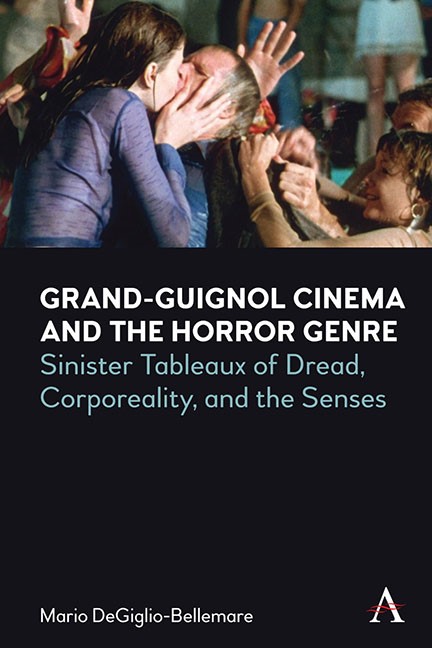Book contents
- Frontmatter
- Dedication
- Contents
- Miscellaneous Frontmatter
- Introduction: Grand-Guignol Cinema and the Senses: Eyes Without a Face, Attractions, Affect and Facial Trauma
- Chapter One The Grand-Guignol Theatre: A Short History of theTheatre and Spatial Ecologies of Dread The Hitch-Hiker and Shivers
- Chapter Two Grotesque Carnivals of “Stubborn” Aurality: Embodied Discourse in Early Talkie Horror Cinema Murders in the Rue Morgue, Freaks, and The Black Cat
- Chapter Three The Sight of Corpses in the Ruins of Modernity: Surgical Sadists under Censorship: The Body Snatcher, and Mad Love, The Blood of the Beasts
- Chapter Four Erotic Abattoirs of Bad Taste: Unproductive Potlatch in Exploitation Cinema: Fascination, Grapes of Death, and Salò, or 120 Days of Sodom
- Chapter Five French Colonial Skinning: Affect and Becoming-Wound in the Cinema of Sensation: Trouble Every Day, Sombre, and In My Skin
- Conclusion: Drag Performativity and Multisensorial Dread Blood and Black Lace and Psycho
- Bibliography
- Index
Chapter Four - Erotic Abattoirs of Bad Taste: Unproductive Potlatch in Exploitation Cinema: Fascination, Grapes of Death, and Salò, or 120 Days of Sodom
Published online by Cambridge University Press: 15 November 2023
- Frontmatter
- Dedication
- Contents
- Miscellaneous Frontmatter
- Introduction: Grand-Guignol Cinema and the Senses: Eyes Without a Face, Attractions, Affect and Facial Trauma
- Chapter One The Grand-Guignol Theatre: A Short History of theTheatre and Spatial Ecologies of Dread The Hitch-Hiker and Shivers
- Chapter Two Grotesque Carnivals of “Stubborn” Aurality: Embodied Discourse in Early Talkie Horror Cinema Murders in the Rue Morgue, Freaks, and The Black Cat
- Chapter Three The Sight of Corpses in the Ruins of Modernity: Surgical Sadists under Censorship: The Body Snatcher, and Mad Love, The Blood of the Beasts
- Chapter Four Erotic Abattoirs of Bad Taste: Unproductive Potlatch in Exploitation Cinema: Fascination, Grapes of Death, and Salò, or 120 Days of Sodom
- Chapter Five French Colonial Skinning: Affect and Becoming-Wound in the Cinema of Sensation: Trouble Every Day, Sombre, and In My Skin
- Conclusion: Drag Performativity and Multisensorial Dread Blood and Black Lace and Psycho
- Bibliography
- Index
Summary
Fascination, Grapes of Death, and Salò, or 120 Days of Sodom
In this chapter I will examine films that deal with sensorial taste and its intersection with cinematic “bad taste,” chief among them Jean Rollin’s Fascination (1979). This continues the overall project’s impetus to engage with Grand-Guignol cinema via the senses. Thus far I have dealt with concepts ranging from a Bakhtinian semiotics of utterance and carnival, the anthropophagic eating of discourse and the shocking sight of corpses in the Benjaminean ruins of modernity. Here I will enlist the transgressive potlatch theory of Georges Bataille as it embodies the excess of threshold experiences in unproductive consumption under capitalism. Bataille is very prominent in this chapter, in part because he proved very influential within Rollin’s oeuvre. This chapter will demonstrate Bataille’s intellectual and artistic influence on Rollin’s films, particularly around excess as a concept. My corporeal examination of Grand-Guignol cinema takes me, in this chapter, to consider predominantly the sense of taste, and its inter-relatedness to the sense of smell. I will continue my examination of odour in the Conclusion, as smell continues to be an under-examined sense in film studies (Marks, 2000). Rollin is often wrongly singled out as the one and only horror auteur in the development of the French fantastic in cinema, which is a short-sighted view of its development (Allmer, Brick and Huxley, 2012: 91). However, many of his films are classified in liminal ways and have deep resonances with the threshold experiences of the Grand-Guignol, especially as they mingle the erotic with horror.
Agnès Pierron has argued that “the Grand-Guignol is fascinated by thresh-olds, in-between places, instances where an individual is between life and death, states of consciousness and unconsciousness, normality and madness. The guillotine is [its] privileged instrument…” (1995: XLVIII). There are no guillotines in the cinema of Rollin—the scythe is his tool of choice—yet his depiction of a secret blood circle in Fascination does refer to the headless figure of the Acéphelic Man that Bataille presented in the mid-1930s. In this, Bataille, too, conjured a secret circle of devotees who sought to put into practice the transgressive notions of his theorising.
- Type
- Chapter
- Information
- Grand-Guignol Cinema and the Horror GenreSinister Tableaux of Dread, Corporeality and the Senses, pp. 139 - 176Publisher: Anthem PressPrint publication year: 2023



